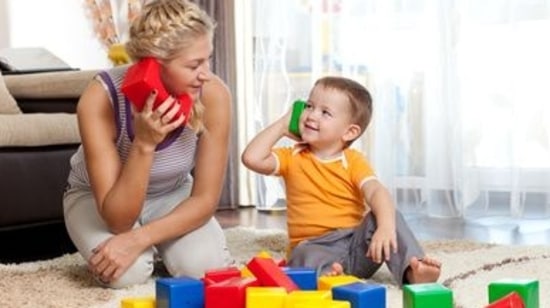
Empowering toddlers: Effective techniques for articulating emotions
9 months ago | 89 Views
Encouraging toddlers to confidently articulate their thoughts and emotions entails employing several effective strategies. Like they say, “The beauty of expression lies in its honesty; speak from your heart and your words will resonate with truth.”
In an interview with Lifestyle, Saloni Verma, Co-Founder and Chairperson at Sunshine Corporate Creches, shared, “First and foremost, active listening plays a pivotal role. By attentively tuning in to their words and gestures, acknowledging their feelings and validating their experiences, toddlers feel heard and understood, fostering their confidence to express themselves openly. Additionally, employing emotion coaching techniques proves invaluable. Teaching toddlers about various emotions and providing guidance on expressing them appropriately empowers them to navigate complex feelings with assurance. Utilising age-appropriate language and clear explanations aids in comprehension, enabling toddlers to articulate their thoughts more effectively.”
She suggested, “Creating a safe and nurturing environment is paramount. A non-judgmental space encourages toddlers to share their thoughts and emotions without fear of criticism. Role modeling healthy communication habits by openly expressing thoughts and emotions contributes significantly to their development. Furthermore, incorporating play-based activities like storytelling and role-playing fosters creative expression and boosts confidence in verbalizing thoughts and feelings. Celebrating their efforts and praising their communication skills further reinforces their confidence, ultimately nurturing their ability to articulate thoughts and emotions with assurance.”
Bringing his expertise to the same, Nasir Shaikh, Group CEO at The Lexicon Group of Institutes, EduCrack and Easy Recruit Plus, said, “Did you know that a toddler's communication skills are like tiny seeds waiting for the right conditions to sprout? As caregivers, educators, and parents, it is our responsibility to provide them with fertile ground filled with trust and empathy. It is fascinating to witness a little one's first attempts to express themselves through babbling. This is their way of exploring the world around them and trying to communicate their needs and desires. By actively listening and engaging with them, we can encourage and support their language development. One crucial aspect of nurturing a toddler's communication skills is mirroring their emotions. When they experience joy, sadness, frustration, or any other emotion, it is essential to validate and acknowledge their feelings. By doing so, we create a safe space for them to express themselves fully and without fear.”
Asserting that as we show empathy towards their emotions, we help them develop a healthy emotional intelligence, which will benefit them throughout their lives, Nasir Shaikh advised, “By mirroring their emotions, we are teaching them that it is okay to feel everything: happiness, anger, confusion, or even fear. This validation fosters their self-confidence and helps them form a stronger sense of self. In this digital age, where screens and gadgets dominate our lives, it is crucial to prioritise human connection and meaningful interactions. By dedicating quality time to listen to our little ones, we are fostering a secure attachment. This attachment provides them with the confidence to explore and communicate in their own unique ways. Let's be mindful of the fertile ground we provide for our toddlers' communication skills. By creating an environment filled with trust, empathy and patience, we are nurturing their blossoming abilities to express themselves and connect with others. Together, let's sow the seeds for their future success in communication and relationships.”
According to Manyyaa Adlakkha, Mind Coach, Founder of Vastuguru Manyyaa, Astrologer and Numerologist, “In the delightful chaos of toddlerhood, every babble, every gesture, and every giggle holds significance. As parents, caregivers, and educators, we play a crucial role in nurturing these budding communicators, helping them find their voice in a world brimming with emotions and experiences. Guiding toddlers to articulate their thoughts and emotions with confidence is not just about language development; it's about empowering them to navigate their world with clarity and self-assurance.”
As an NLP practitioner and mind coach who understood the importance of helping toddlers articulate their thoughts and emotions with confidence, he pointed out that toddlers are at a crucial stage of development where they are learning to express themselves and navigate the world around them. So, let's explore some effective strategies to unlock the potential of these tiny talkers and foster a strong foundation for their communication journey -
1. Encourage Open Communication:
Create a safe and nurturing environment where toddlers feel comfortable expressing themselves. Encourage them to share their thoughts and feelings openly without fear of judgment.
2. Active Listening:
Practice active listening by giving your full attention when toddlers are speaking. Validate their feelings and acknowledge their efforts to communicate, even if their words are not yet clear.
3. Expand Vocabulary:
Introduce new words and concepts in everyday conversations. Use simple language and repeat key words to help toddlers understand and incorporate them into their vocabulary.
4. Emotional Awareness:
Help toddlers identify and label their emotions. Teach them words like happy, sad, angry, and scared, and discuss situations where they might experience these feelings.
5. Lead by Example:
Model confident communication by expressing your own thoughts and emotions openly. Show toddlers how to communicate assertively and respectfully.
6. Practice Empathy:
Teach toddlers to empathise with others by discussing different perspectives and feelings. Encourage them to consider how their words and actions affect those around them.
7. Celebrate Progress:
Celebrate every milestone and improvement in their communication skills. Positive reinforcement boosts their confidence and encourages continued growth.
By implementing these strategies, we can empower toddlers to communicate their thoughts and emotions with confidence, setting a strong foundation for their future social and emotional development.
Read Also: World Nature Conservation Day: How technology is helping in wildlife conservation
#




















